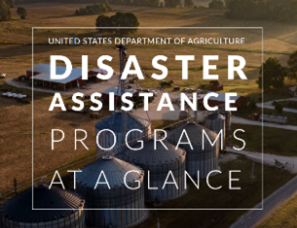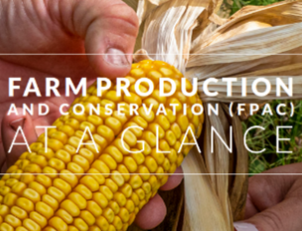Deputy Agricultural Commissioner Nelson Perez
This division is mandated to monitor agricultural and urban areas for harmful exotic pests in order to protect the local agricultural industry, environment, the public, and urban landscaping. This is largely accomplished through trapping, visual surveys, and the inspection of incoming nursery stock. The division also provides field inspection services for seed exporters where inspection of the mother plants is required and provides pest identification services.
Trapping
Did you find a trap in your tree or yard? To request that a trap be removed or suggest a location for a trap please contact our office.
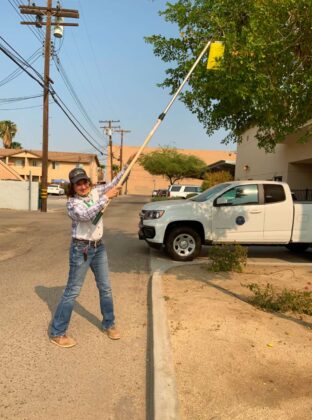
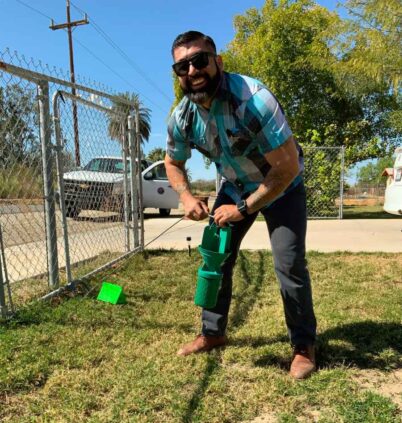
Nursery
Production nurseries are inspected to ensure that they meet state nursery cleanliness standards. All plant nurseries need to be licensed with CDFA.
Ozonium Root Rot Certification
This program is to certify ground or container grown plants as free from Ozonium Root Rot (ORR). ORR is a naturally occurring soil bourne fungus that affects over 2,000 plant species. Certification is needed for those wishing to export plants to certain counties or states. Please contact us if you have questions about a particular county's or state's requirements.
Bee Swarms and Mosquitoes
For more information about bee swarms and mosquitoes, or how to report a bee nest or possible mosquito breeding habitat please contact Imperial County Vector Control.
Deputy Agricultural Commissioner Sandra Mendivil
The Pest Exclusion and Quarantine Program seeks to stop the introduction of harmful pests into Imperial County and California. Pest exclusion is the first line of defense against invasion by exotic pests. Incoming commercial and private shipments of plant material and seed are subject to inspection of compliance with plant import restrictions. Infested or prohibited shipments are subject to regulatory action. Plant quarantines and nursery and seed laws, all protect the industry and environment by excluding plant pests through inspections and certification. Direct Marketing Laws are enforced. Commodities are also inspected and certified prior to shipping to other states and foreign countries.
Seed
Incoming seed shipments are inspected to ensure that the seed meets California seed law and meets quarantine requirements. Seed labelers and facilities are inspected.
PQ: Field Inspection Services
This program, also known as the Phytosanitary Field Inspection of Seed program, is performed to certify the mother plants of seed producing fields to allow for export. Not every country requires this inspection and you can contact us if you would like more information on individual country requirements.
Direct Marketing: Certified Producer's Certificates (CPC)
Growers looking to certify their produce for sale at Certified Farmer’s Markets are inspected.
Import and Export Services
Export documents are provided for commodities leaving Imperial County to other states and countries to ensure the commodities meet import requirements. Commodities imported into this county are inspected for quarantine pests.
Pest Identification Services
The chief purpose of our pest identification service is to provide, at no charge, a means for the agricultural industry and members of the public to have plant pests identified.
Deputy Agricultural Commissioner Julian Lopez
The Agricultural Commissioner is responsible for implementing and enforcing the laws and regulations of the pesticide use enforcement program and for issuing permits for all Restricted Use Materials and Operator Identification Numbers to agricultural pesticide applicators. Growers of crops onto which restricted pesticides are to be applied are required to obtain a user permit which defines the manner, method, and approximate time of the proposed application.
All agricultural and commercial pesticide applications are randomly monitored to ensure that pesticides are handled in an environmentally safe manner and that pesticide handlers, field workers, and the community are protected. In addition, any illness or complaint of exposure resulting from pesticide use is investigated and reported to the State of California Department of Pesticide Regulation.
PUE Office Hours
Main Office
Monday - Friday
7:00 a.m. - 12:00 p.m., 1:00 p.m. - 4:30 p.m.
Brawley Office
By appointment only.
Deputy Agricultural Commissioner Margo Sanchez
The Special Projects Division work on a variety of projects as needed by the department. The crop report, Planning Department projects/CEQA issues, Point-of-Sale Inspections, and disaster designation investigations are standing assignments.
Planning
We work closely with Imperial County Planning and Development Services on California Environmental Quality Act (CEQA) issues. We review and comment on proposed projects per CEQA requirements, and are a member of the Environmental Evaluation Committee. Some projects are required to include a Pest Management Plan in order to protect nearby agriculture from pests; we review and approve the Plan, then monitor for compliance.
Disaster Designation & Assistance
When significant crop losses are caused by inclement weather, earthquakes, or other events our office is responsible for compiling data and evidence on the losses. If minimum thresholds of loss are met, forms are completed and submitted to USDA for their determination. A USDA disaster designation may qualify local growers for low interest loans or other federal financial assistance depending on the commodity and other factors.
In the event of crop losses due to an external event, please contact our office, as we may not be aware of the event or the crop losses, and we will need to collect data on the losses to report to USDA. The types of events that may trigger an investigation are frost, flood, hail, wind, earthquakes, etc. Drought events are Fast Tracked through USDA and don't require county investigations.
Here are some examples of USDA assistance programs:
The Emergency Loan Program offers loans to affected farmers. This program requires a 30% loss of:
- All crops countywide
- An individual crop type across the county
- Crop or physical losses of a single producer
Various livestock programs offer a payout up to 75% of fair market value for livestock mortality (in excess of normal) as a result of extreme weather, some diseases, some hardship due to weather events, or predation by animals released into the wild by the Federal Government.
The Tree Assistance Program offers a percentage payout toward the cost of replanting and requires a 15% loss of a stand due to weather or disease.
Each of these programs has specific exclusions and exemptions. Interested parties should follow the links to the USDA Disaster Assistance pages for more information.
Additional Resources for Disaster Relief
We wanted to share that CDFA has a webpage available on flooding-related resources: https://www.cdfa.ca.gov/FloodRecovery/, which includes information related to produce safety provided by FDA, LGMA, and University of California. Please note, the webpage would be updated with more current information through the season and we encourage you to check it regularly. Links from FDA and University of California are also included below.
- US FDA: Safety of Food and Animal Food Crops Affected by Hurricanes, Flooding, and Power Outages
- University of California:
- UC Food Safety: Food Safety After a Disaster
- UC Small Farm Food Safety: Produce Safety and Flood Resources
- UC Small Farm Food Safety: Potential Biological Hazards Associated with Use of Contaminated Agricultural Water
USDA Farm Service Agency
Local Contact - Rogelio Araujo
Disaster Resource Center - https://www.usda.gov/about-usda/disaster-resource-center
USDA Rural Development
Deputy Agricultural Commissioner Margo Sanchez
Imperial County weights and measures officials serve all consumers as the local regulatory agency authorized to enforce the B&P Code and the CCR pertaining to issues of "Equity in the Market Place".
Point of Sale (POS) / Price Accuracy
- Annual POS inspections are conducted to ensure that each consumer is paying the lowest advertised price posted, quoted, or otherwise advertised. All retail establishments with POS devices are inspected annually.
- "Point-of-Sale" system means any computer or electronic system used by a retail establishment such as, but not limited to, Universal Product Code scanners, price lookup codes, or an electronic price lookup system as a means for determining the price of the item being purchased by a consumer (BPC § 13352)
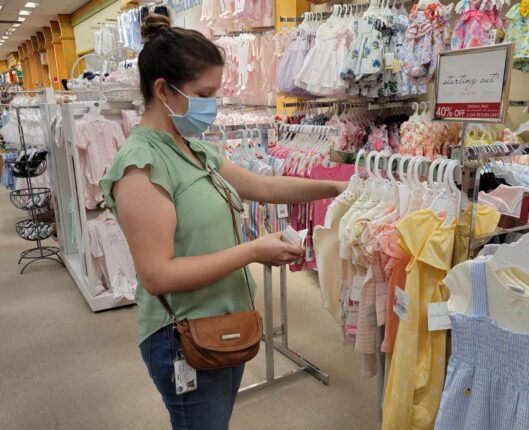
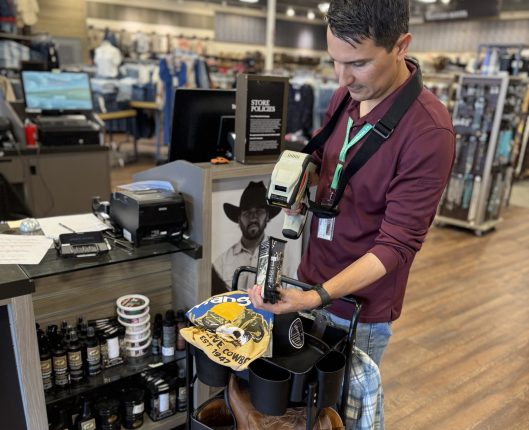
Scales and Meters
Commercial weighing and measuring devices are inspected annually. Inspectors verify each device is approved for its intended use and test each device for accuracy. If a device is accurate, a county paper seal is attached which certifies the device as being “correct”.

Petroleum Products
Petroleum advertising and labeling requirements are checked by county sealers as well as the quality of petroleum products.
Quantity Control
All packages are required to have a net quantity statement on the principal display panel. W&M inspectors test these packages to ensure they hold the correct amount. IRQ (Identity, Responsibility, and Quantity) are required on all labels.
Weighmaster
A weighmaster weighs, measures, or counts bulk products and issues certificates of accuracy. Weighmaster certificates are legal documents used to buy and sell products. Weighmaster licenses are issued by DMS.
Service Agents
Service Agents are device repairmen who are private businesses authorized to repair weighing and measuring devices placed out of order by officials. A service agent must notify our office in writing within 24 hours of repairing a device or placing a new device in service. Service agent licenses are issued by DMS.


